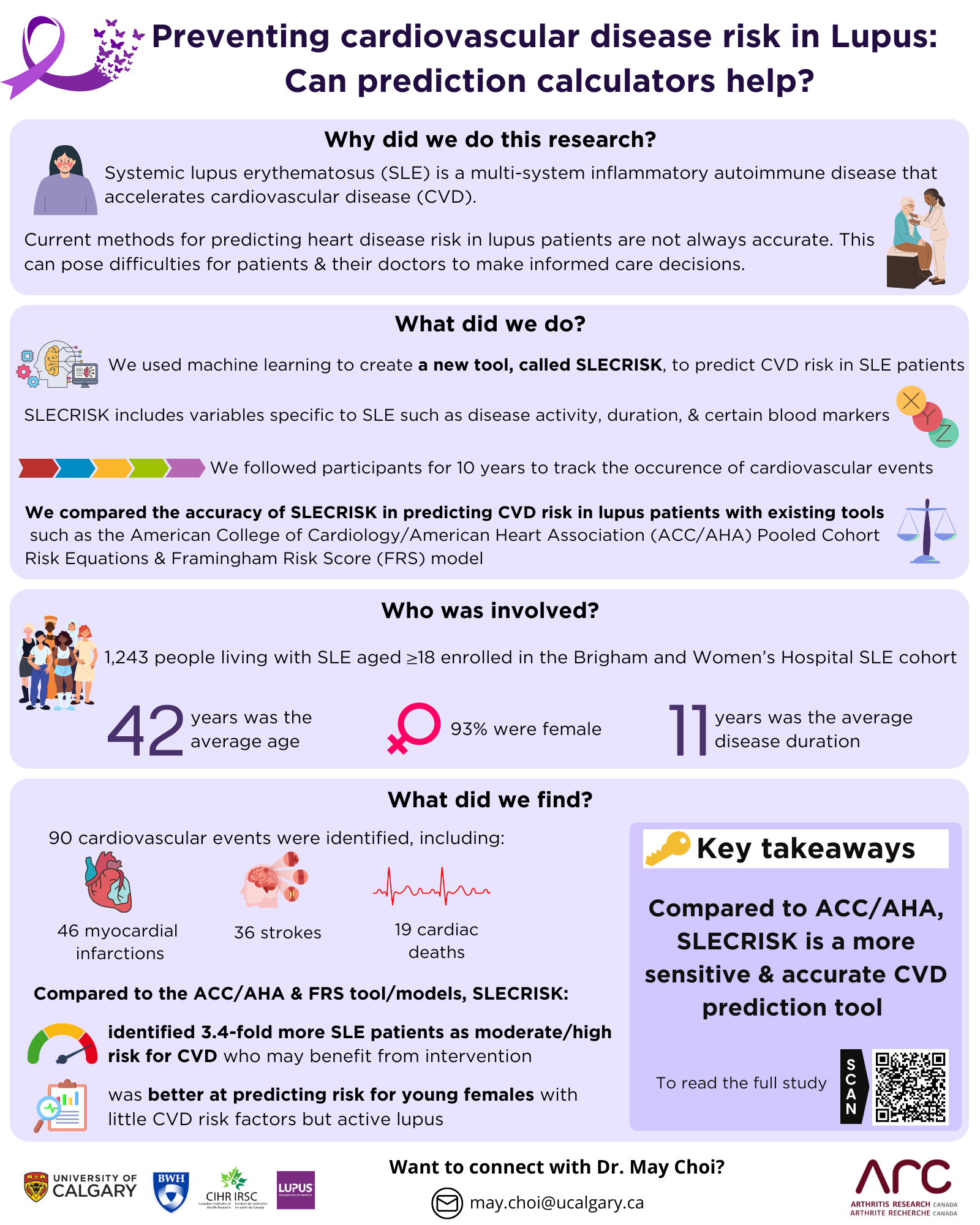Using Technology to Predict the Risk of Heart Disease for People with Lupus
Scientific Study title:
SLE-CALCULATOR: Systemic Lupus Erythematosus CArdiovascuLar Disease Event Risk PrediCtion Using Machine LeArning Techniques and NOvel ThRombotic Autoantibodies
Study Start Date:
2021
Study End Date:
2023
Why Did We Do This Research?
Cardiovascular disease (CVD), such as heart disease and stroke, is the most common cause of death in people with systemic lupus erythematosus (SLE). However, the reason for a higher risk of cardiovascular disease in people with lupus is unknown. Researchers think it could be due to inflammation from systemic lupus erythematosus and/or the medications used to treat it. An accurate way to measure the risk of cardiovascular disease is needed to identify lupus patients who may benefit from cardiovascular disease prevention interventions. Therefore, the goal of this study was to create a systemic lupus erythematosus cardiovascular disease prediction tool, that could be used in clinical settings to identify risks for heart disease and stroke early in the life of people with lupus.
What Did We Do?
First, we developed a new tool, called SLECRISK, specifically designed to predict cardiovascular disease risk in systemic lupus erythematosus patients. This tool was created using machine learning. Machine learning teaches computers to learn information from data using statistics. Variables specific to systemic lupus erythematosus like disease activity, duration, and certain blood markers were included in the SLECRISK tool.
We studied patients who were 18 years of age or older, enrolled in the Brigham and Women’s Hospital systemic lupus erythematosus cohort. We collected data at the beginning of the study, including information such as traditional cardiovascular disease risk factors (e.g., blood pressure), patient demographics, and SLE-specific characteristics (e.g., serum creatinine). We followed patients for ten years to track the occurrence of major adverse cardiovascular events, such as heart attacks, strokes, or cardiac deaths. We used medical codes and had cardiologists confirm each event. We compared SLECRISK with existing tools like the American College of Cardiology/American Heart Association (ACC/AHA) Pooled Cohort Risk Equations, Framingham Risk Score (FRS), and modified FRS (mFRS).
What Did We Find?
A total of 1,243 systemic lupus erythematosus patients over 10 years were included in this study, during which there were 90 major adverse cardiovascular events. SLECRISK was found to be more sensitive in identifying patients at moderate to high risk (≥7.5%) of major adverse cardiovascular events compared to the ACC/AHA model. SLECRISK also identified significantly more high-risk patients than ACC/AHA, particularly younger women with severe systemic lupus erythematosus who didn’t show many traditional cardiovascular disease risk factors. This research is important because it shows that SLECRISK is a more sensitive and slightly more accurate cardiovascular disease prediction tool.

The Research Team
Principal Investigator:
May Y. Choi, MD, FRCPC, Research Scientist, Arthritis Research Canada (University of Calgary)
Co-Investigators:
Karen H. Costenbader, MD, MPH (Brigham and Women’s Hospital & Harvard Medical School)
Brittany Weber, MD, PhD (Brigham and Women’s Hospital & Harvard Medical School)
Who Funded This Research?
Canadian Institutes of Health Research and the Lupus Foundation of America
Related Publications:
- Choi MY, Guan H, Yoshida K, Paudel M, Kargere BA, Li D, Ellrodt J, Stevens E, Cai T, Weber BN, Everett BM, Costenbader KH. Personalizing cardiovascular risk prediction for patients with systemic lupus erythematosus. Semin Arthritis Rheum. 2024 Aug;67:152468. doi: 10.1016/j.semarthrit.2024.152468. Epub 2024 May 17. PMID: 38788567; PMCID: PMC11214838.
- Shantz E, Elliott SJ, Sperling C, Buhler K, Costenbader KH, Choi MY. Towards an understanding of the biopsychosocial determinants of CVD in SLE: a scoping review. Lupus Sci Med. 2024 Jul 24;11(2):e001155. doi: 10.1136/lupus-2024-001155. PMID: 39053931; PMCID: PMC11284934.

















































